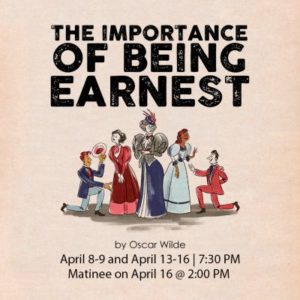OGDEN — Oscar Wilde, Irish poet, wit, author, and playwright was once quoted as saying, “Life is much too important a thing ever to talk seriously about it.” Evidence of this attitude toward living can be found in his well-known works, including A Woman of No Importance, An Ideal Husband, and in his many literary publications and lectures of the time. But nowhere is this more truly exemplified than in his most popular theatrical work, The Importance of Being Earnest. Written in 1894 and receiving its theatrical debut in London in February 1895, Wilde created a carefully constructed representation of Victorian society, while simultaneously mocking it. It is widely considered his masterpiece and has been revived and produced thousands of times all over the world. The wickedly funny plot makes use of double identities and flights of fancy, when the main characters Algernon Moncrieff and Jack Worthing discover that they both indulge in a seemingly harmless practice of “Bunburying,” or rather pretending to be two different people so as to allow themselves more freedom to indulge in more raucous escapades while maintaining their upright moral characters at home.

This latest production of The Importance of Being Earnest is an admirable addition to the long list of beautiful productions at Weber State. Directed by Tracy Callahan, the production design staff have outdone themselves visually, as the sets, lights and (especially) costumes are stunning. Scenic designer Cully Long takes a stylized approach to the backdrops, depicting the three locations of the play in quirky, almost realistic, slightly off-kilter lines and picked out in a striking color palette of peacock blue and persimmon orange. The effect is beautiful, and the color palette is continued in the costume design, creating a visually harmonious scene.
Catherine Zublin has created jaw-droppingly gorgeous attire for the entire cast, but especially for Gwendolyn Fairfax (played by Allie White) and Lady Bracknell (played by Sarah Greenwell). Each dress was more stunning than the last. The rich choice of pattern and fabric and trims combined to clearly illustrate their status and wealth, and the leg of mutton sleeves were deliciously, ridiculously huge. Algernon’s kit was equally rich and opulent, depicting him as a wealthy, lazy fop and gave actor Jacob Stubbs a wonderful air of indolence. His second act suit was especially delightful. These people are clearly not of the working class.
Jack Worthing’s outfits were not as spectacular or memorable, but serviceable and elegant, yet rather plain compared to the others. They told a different story about who Jack Worthing was and what he found important. Cecily Cardew was sweetness itself in a pink gown with an unexpected glimpse now and then of a blue slipper. It was such a fun hint of an underlying unexpectedness to her character. Miss Prism was appropriately trim and busy, Reverend Chasuble was stodgy, and the manservants Lane and Merriman were picture perfect. The costume design and construction team’s work was truly marvelous and surpassed all expectations I had for the show.
Marley Keith‘s lighting design was subtle and successful. Keith effectively created a different feel to the quality of light found in a London flat versus the look and feel of the countryside. The artificial light provided by lamps had a cooler feel than the sunshine outdoors. The highlight was the gorgeous sunset that crept up the cyclorama in the last act and bathed everything in a picturesque glow, again using the same color palette ranging from peacock blue to orangey peach. The lighting and set blended to make a beautiful background for the play.
Given the stylized and exaggerated design elements, the acting was also inflated and overblown, which fit the overall tone of the play. Each woman’s posture was straitened and confined by corsets and petticoats and hats and reticules, and they moved a bit like Barbie dolls, with arms held stiffly away from the body as if to balance themselves (or perhaps to keep their sleeves properly elevated?) The effect grew more pronounced as the women aged, from Cecily who was more natural and girlish, to Lady Bracknell who looked and moved as rigidly as a battle axe. Only men are allowed to lounge in any way in the Victorian Era.
Likewise, the vocal delivery of all the actors was affected and unnatural, again fitting in with the overall artificiality of the work. Every word was almost overly articulated and precise, and the actors often turned to face the audience directly, whether or not there were other people in the scene. Wilde’s dialogue is famous for its rapier wit and lightening quick humor, but when delivered this deliberately, it loses some of the brightness and quality of impromptu repartee. On the one hand, the rejoinders have less of a sparkling quality, but on the other hand, I heard every joke. And there is still so much to enjoy in Wilde’s characters and their puffed-up sense of self-importance.
All in all The Importance of Being Earnest was a lovely evening of theatre. Everything was cleverly planned, beautifully designed, and expertly crafted to bring these characters to life. Whether audience members are already Oscar Wilde fans or as yet unacquainted with his work, this production is a gorgeous way to spend an evening.
[box]The Importance of Being Earnest plays Thursdays through Saturdays at 7:30 PM and Saturdays at 2 PM at the Allred Theatre in the Browning Center for the Performing Arts (3950 West Campus Drive, Ogden) on the campus of Weber State University. Tickets are $12-15. For more information, visit www.weber.edu/artscalendar.[/box]
